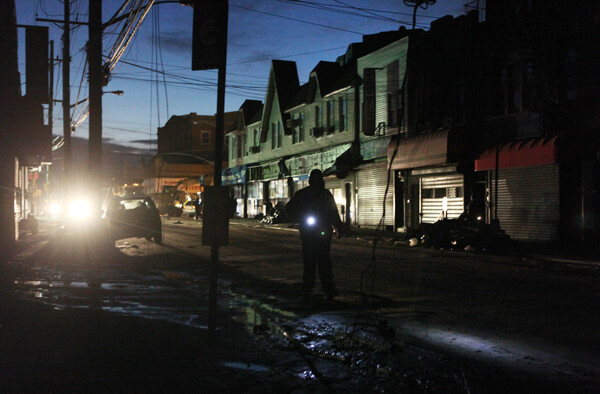By Karen Frantz
Almost three months after the Rockaways were plunged into darkness for weeks following the wrath of Hurricane Sandy, a commission investigating the ability of the Long Island Power Authority, the peninsula’s main supplier of power, to deal with devastating storms found the utility is severely dysfunctional with little oversight and in desperate need of change.
“There is an immediate need to do something about LIPA,” said Nassau County District Attorney Kathleen Rice.
Rice is a member of the Moreland Commission, which held a public hearing on its initial findings in the Rockaways last Thursday.
Rice called LIPA’s response to Hurricane Sandy woefully inefficient and said the commission found the only option for improving the utility would be complete overhaul. She said the commission recommended turning LIPA into a private entity, a proposal Gov. Andrew Cuomo also took up in his State of the State address.
The commission argued privatization would create cost savings and efficiencies. It also added that although LIPA is several billion dollars in debt, it would be possible to allow stranded debt to be refinanced and paid back over time so it would not result in immediate increased rates for consumers.
The Moreland Commission was created by Cuomo after Hurricane Sandy to look into New York utility companies’ emergency preparedness and response and make recommendations for reform. The commission presented its interim report to Cuomo this month and anticipates a final report to be completed later this year.
Members from the commission, including Rice, Executive Director Regina Calcaterra and commission Co-Chairman Ben Lawsky, presented their findings to a sparse crowd at the Challenge Preparatory Charter School, at 710 Hartman Lane in Far Rockaway.
Lawsky said one of the main problems plaguing LIPA is the lack of government oversight. He recommended bolstering the authority of the state Public Service Commission, the agency that oversees state utility companies, by giving it the power to review the fitness of utilities and levy steeper fines for violations.
“Whatever you do with LIPA, whatever you do going forward, you need a regulator who is going to stay on these utilities,” he said.
Another problem affecting LIPA’s performance during storms, the commission found, is a bifurcated organizational structure in which LIPA is the owner of the utility but operation falls to National Grid.
Rice said the structure led to dysfunction and a communication breakdown between LIPA and National Grid.
“There is no accountability because LIPA can point to National Grid and National Grid can point to LIPA and the big looser in all of that is you,” she said.
Although people attending the hearing seemed to appreciate the commission’s assessment of LIPA’s problems, many took issue with its chief recommendation that the utility be refigured as a private entity.
One woman who testified said she feared a private utility would favor profits over people.
“We deserve a service that’s people-oriented,” she said.
But Lawsky defended the recommendation, saying a private utility would be more efficient.
“The best way to make profits is to make your customers happy,” he said.
He also argued that public utilities are not always the best option, pointing out LIPA as a public entity has been dysfunctional.
“It wasn’t profit-oriented, it wasn’t people-oriented. If anything, it was disoriented,” he said.
Reach reporter Karen Frantz by e-mail at kfrantz@cnglocal.com or by phone at 718-260-4538.





































